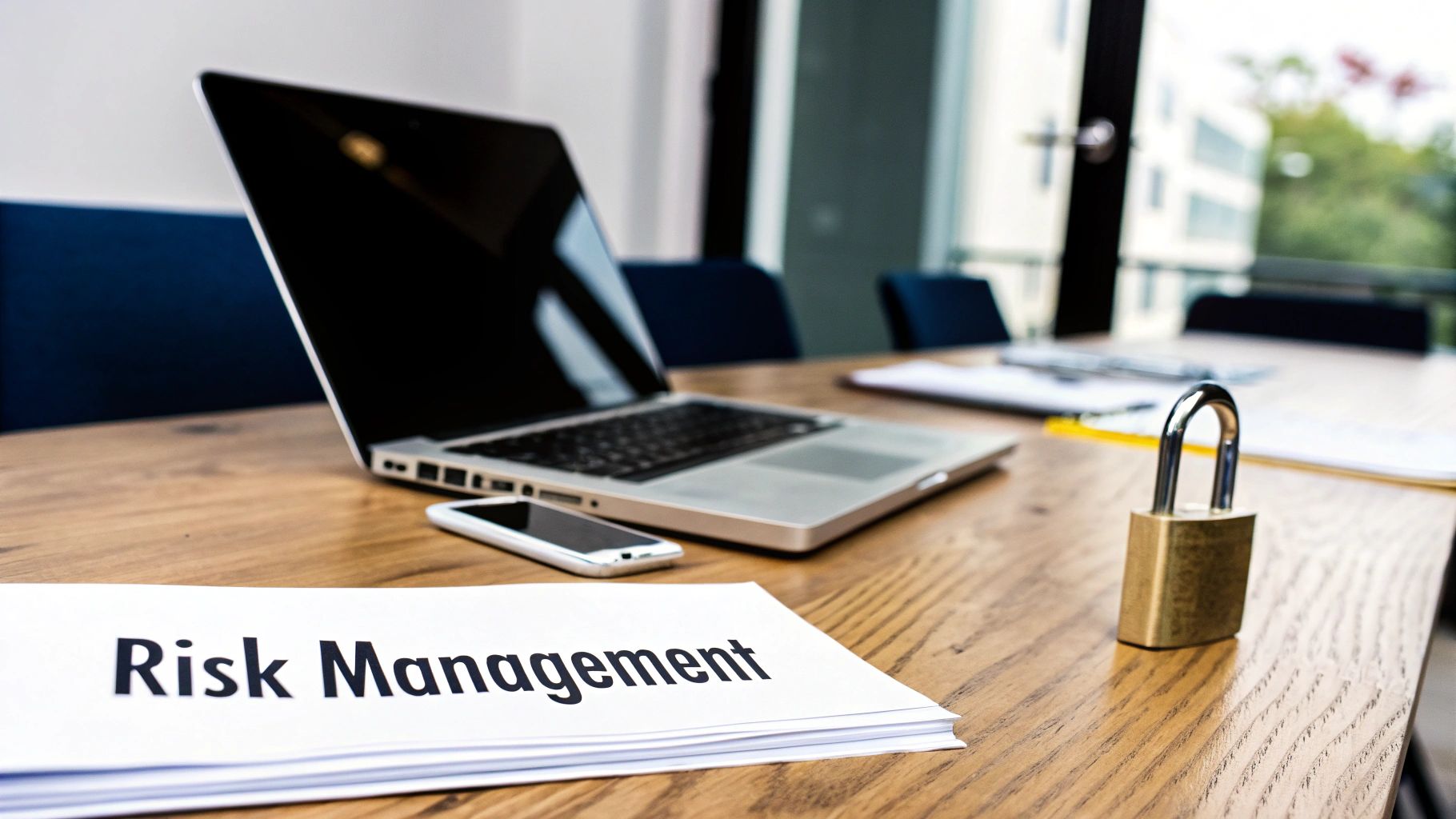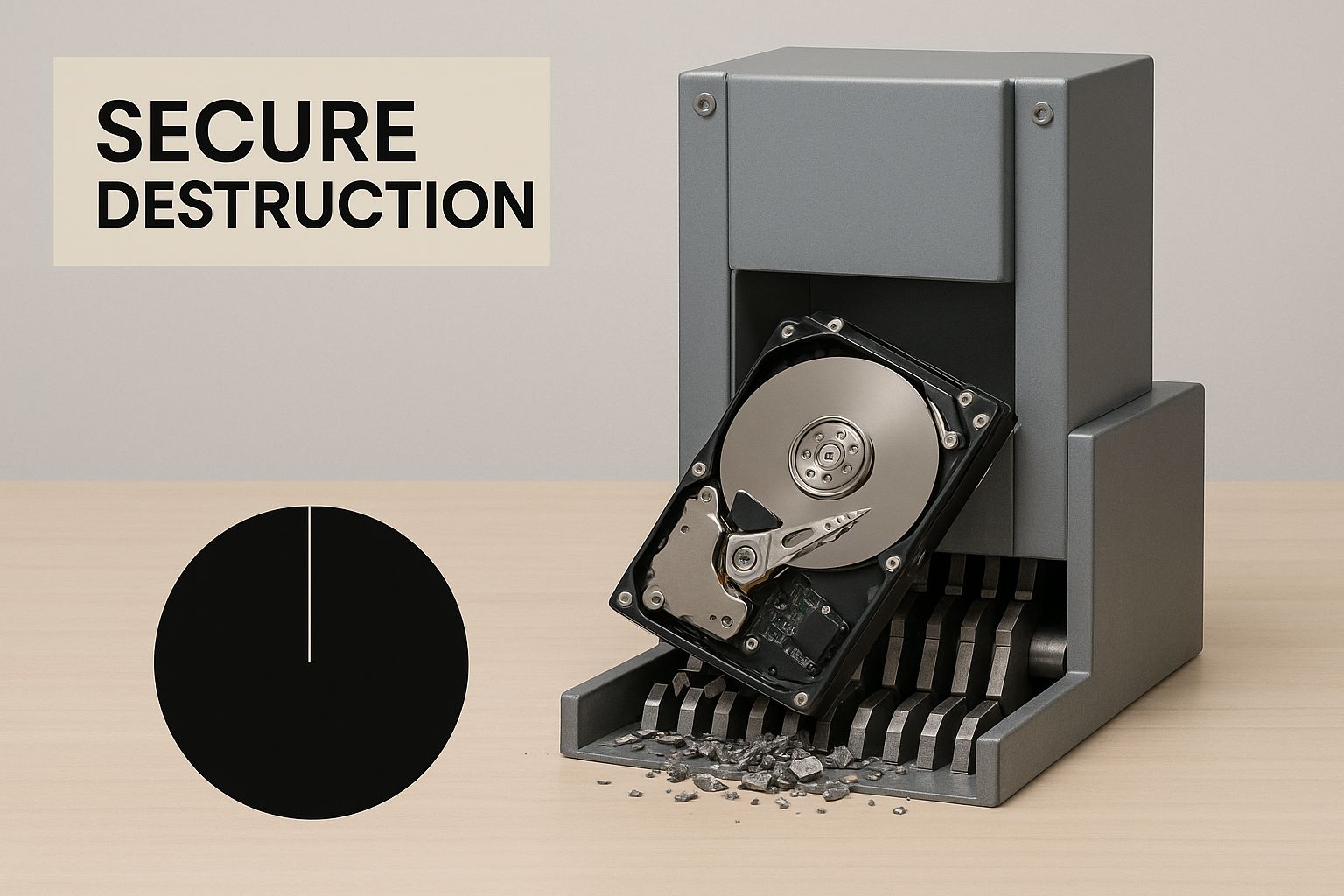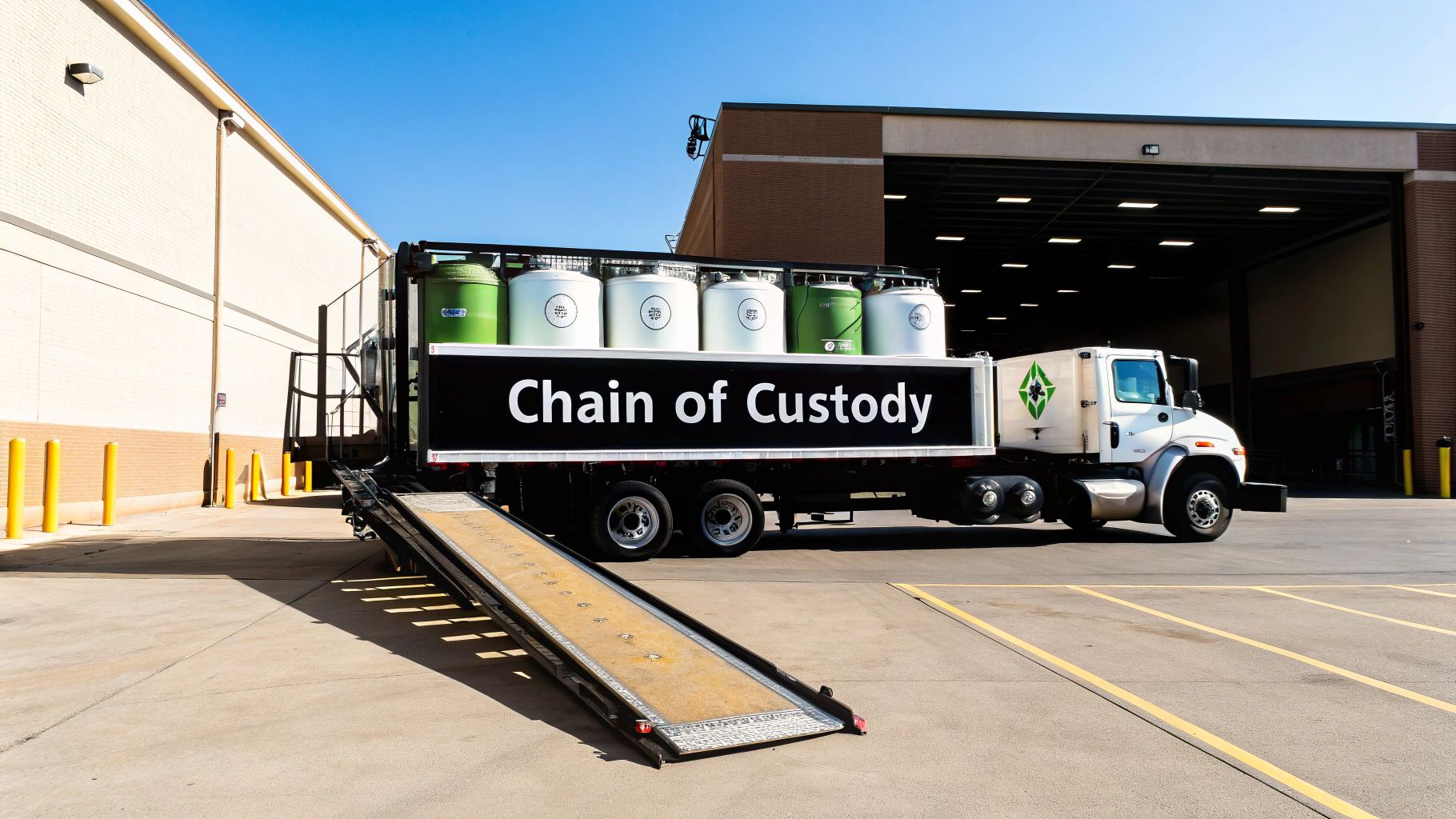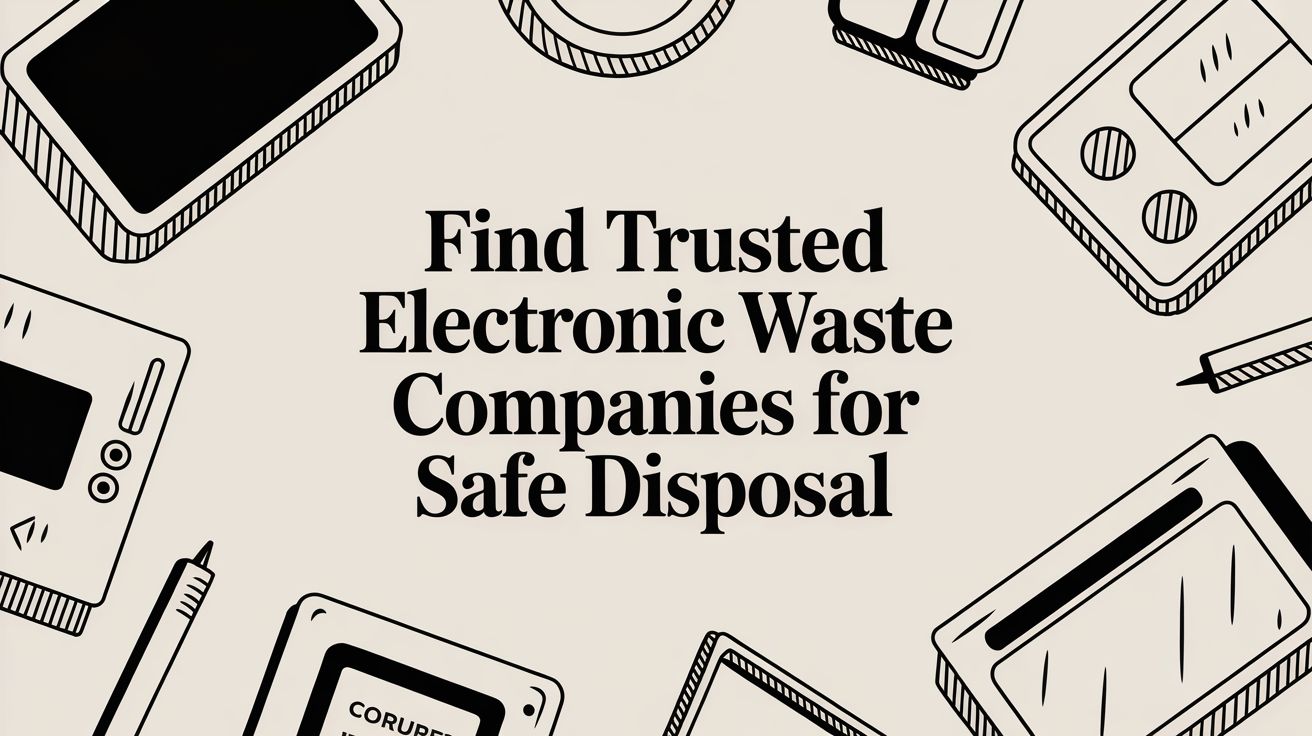Picking the right partner for your electronic waste is so much more than just getting rid of old gear. It's a massive decision that directly touches your company's finances, legal obligations, and what the public thinks of you. Think of these companies as your front-line defense against data breaches, hefty environmental fines, and the kind of brand damage that’s hard to shake.
Why Your E-Waste Partner Is a Critical Business Decision

Every single business, from a two-person startup to a global enterprise, is constantly creating electronic waste. Laptops, servers, monitors, and phones—they all eventually die. When they do, the problem isn't about clearing out a storage closet. It's about managing the enormous risk locked inside every single device.
Simply tossing this stuff out is a direct threat to your bottom line. Just one discarded hard drive can hold a goldmine of sensitive info: customer lists, private financial records, and your company's secret sauce. If that data gets into the wrong hands, the fallout can be absolutely catastrophic. We're talking expensive lawsuits, regulatory penalties, and a complete shattering of customer trust.
The Real Cost of Cutting Corners
Imagine a doctor's office just chucking old computers into a dumpster behind their building. It wouldn't take much for someone to grab those hard drives and suddenly have access to thousands of patient records. That one careless act could trigger crippling HIPAA fines, class-action lawsuits, and do irreversible damage to their reputation in the community.
This isn't some far-fetched story. Fines for breaking environmental laws can put a company out of business, and the bad press from a data leak can stick to a brand for years. A properly certified e-waste partner isn't just another vendor—they are a core part of your risk management strategy.
Your choice of an e-waste recycler says everything about your company's commitment to data security and environmental responsibility. A cheap, uncertified outfit might save a few bucks today but could end up costing you millions down the road.
The sheer scale of this problem is ballooning. The global e-waste management market was valued at around USD 80 billion recently and is on track to explode to USD 206 billion by 2033. This growth highlights just how many electronics are being retired and why we desperately need responsible ways to handle them.
To illustrate the stakes, here’s a quick rundown of what can go wrong.
Key Risks of Improper E-Waste Disposal
| Risk Category | Potential Business Impact | Mitigation Strategy |
|---|---|---|
| Data Security Breaches | Loss of customer data, intellectual property theft, severe reputational damage, and costly lawsuits. | Partner with a certified recycler offering documented, secure data destruction services (e.g., shredding, degaussing). |
| Legal & Regulatory Fines | Penalties for non-compliance with laws like HIPAA, GDPR, FACTA, and state-level environmental regulations. | Choose a vendor with certifications like R2 or e-Stewards, ensuring they adhere to all relevant legal standards. |
| Environmental Damage | Toxic materials (lead, mercury) contaminating soil and water, leading to cleanup liabilities and negative public perception. | Work with an environmentally responsible partner who can provide transparent reporting on their recycling processes. |
| Brand & Reputational Harm | Being publicly named in a data breach or for illegal dumping can erode customer trust and loyalty overnight. | Proactively manage e-waste with a reputable partner and use it as a positive story for your corporate social responsibility efforts. |
As you can see, the potential downsides are significant, but they are also entirely avoidable with the right approach.
Proactive Management Over Reactive Cleanup
When you team up with professional electronic waste companies, you turn e-waste from a ticking time bomb into a managed, auditable process. These experts give you concrete proof of data destruction and make sure every last component is recycled according to local, state, and federal laws.
For businesses here in Georgia, for instance, getting familiar with the specific guidelines on how to recycle in Atlanta is the perfect starting point. Taking this proactive step protects your data, your brand, and gives you peace of mind, letting you focus on running your business without the ghost of old tech coming back to haunt you.
How to Make Sense of E-Waste Certifications
When you start digging into e-waste companies, you’ll quickly hit a wall of acronyms: R2, e-Stewards, NAID AAA. These aren't just logos they slap on a website; they are your proof that a recycler is serious about security, the environment, and ethical practices.
Think of these certifications as a background check for your recycler. They prove a third-party auditor has kicked the tires and verified the company does what it says it does. Without one, you're just taking them at their word—a risky bet when your company’s data and reputation are on the line.
A certified recycler is held to incredibly high standards covering everything from employee background checks to how they handle toxic materials.
The Big Three Certifications Every Business Should Know
While there are a bunch of certifications out there, a few heavy hitters set the industry standard. Each one has a slightly different focus, so knowing what you're looking for is key.
-
R2 (Responsible Recycling): This is the most common certification you'll see. R2 provides a solid framework for managing electronics responsibly, with a big emphasis on data security, environmental safety, and protecting workers. An R2-certified company has to track and document every single piece of equipment that comes through its doors.
-
e-Stewards: Often seen as the gold standard for environmental protection, e-Stewards has one non-negotiable rule: zero export of hazardous e-waste to developing countries. Some recyclers use this as a loophole, but e-Stewards slams that door shut. They also have tough requirements for data security and worker safety.
-
NAID AAA: This one is all about one thing: bulletproof data destruction. A vendor with NAID AAA certification gets hit with surprise audits to make sure their process for shredding, wiping, and destroying hard drives is airtight. If data security is your top priority, this is the logo you want to see.
Finding a recycler with both an environmental cert like R2 or e-Stewards and the data-focused NAID AAA is the gold standard. It shows a complete commitment to doing things the right way.
Don't Just Trust the Logo—Verify It
Here’s a pro tip: some companies will put a certification logo on their site even if they don't actually have it. Shady, right? Always double-check a vendor's claims on the official certification body’s website.
If a potential partner gets cagey about giving you their certification number or you can't find them in the official directory, walk away. That's a massive red flag.
Another warning sign is a vendor who can’t tell you exactly where your old equipment ends up. Ask them about their downstream process. A legitimate, certified recycler has a transparent, fully audited network of partners who also have to meet strict standards.
The most important document you will get from your recycler is the Certificate of Destruction. This is your legal proof that your data was properly destroyed and that you are no longer liable. It protects you from audits, lawsuits, and fines down the road.
Ultimately, certifications are your peace of mind. They ensure your e-waste partner operates professionally, securely, and ethically. For a deeper dive into why this final document is so critical, you can learn more about what a Certificate of Destruction involves and why your business absolutely needs one.
Evaluating Data Destruction and Security Protocols
Let’s be honest, those retired laptops, servers, and phones sitting in your storage closet aren't just taking up space. They are potential time bombs, loaded with sensitive company and customer information. Hitting 'delete' or doing a factory reset is like putting a "please rob me" sign on your data—it does almost nothing to protect it.
A top-notch e-waste partner gets this. They know their most critical job isn't just recycling plastic and metal; it’s guaranteeing the permanent, irreversible destruction of your data.
When you're vetting electronic waste companies, their approach to data destruction needs to be at the very top of your checklist. The methods they use can vary wildly, and the best one for you often depends on the type of equipment you’re getting rid of.
Comparing Data Destruction Methods
Not all data destruction is created equal. Some methods are just a basic wipe, while others offer the kind of security that makes data recovery physically impossible.
Here are the main options you'll encounter:
- Data Wiping/Sanitization: This is a software-based process that overwrites your data with random characters, usually in several passes. It's a great choice for devices you might want to resell or reuse, since the hardware is left completely intact. To really get into the weeds, check out our complete guide on what data sanitization is and how it works.
- Degaussing: Think of a massive magnet. Degaussing uses a powerful magnetic field to completely scramble the data on hard drives and other magnetic storage, making them unreadable in an instant. It’s fast and effective, but it also destroys the drive in the process.
- Physical Shredding: This is the gold standard for security. The device is literally fed into an industrial shredder that grinds it into tiny, unrecognizable pieces. For absolute maximum security, there’s nothing quite like watching your old hard drives turn into confetti.
This infographic really drives home the finality of secure methods like shredding.

As you can see, you just can't beat physical destruction for high-risk assets. Software-based methods simply can't offer that same level of absolute certainty.
Questions to Ask Your Potential Partner
The destruction method is important, but the process and the paperwork are what truly protect your business. Your vendor should be able to answer these critical questions without hesitation.
A single data breach from an improperly discarded device can lead to millions in fines, lawsuits, and a damaged reputation that’s hard to repair. One healthcare provider learned this the hard way when they faced litigation after patient records were found on "recycled" computers sold on the open market.
You need to grill them on their chain-of-custody documentation. How do they track your assets from the second they leave your office to the moment they're destroyed? That paper trail is your legal proof of due diligence.
It’s also crucial to ask about their facility security, employee background checks, and if they offer on-site shredding services for the ultimate peace of mind.
The sheer amount of e-waste being generated makes this scrutiny more important than ever. The world produced a staggering 62 million tonnes of e-waste in a recent year, a number expected to hit 82 million tonnes by 2030. With only 22.3% of it properly collected and recycled, the risk of your data falling through the cracks is enormous.
When you're choosing a partner, you have to look at their commitment to robust data privacy best practices just as closely as you look at their shredders.
Looking Beyond Landfill Diversion to True Sustainability
Responsible e-waste management isn't just about checking a box to keep old gear out of a landfill. That's the bare minimum. A truly forward-thinking recycling partner sees your retired assets not as trash, but as a valuable source of materials that can be put back into the supply chain.
This mindset is the core of the circular economy. It’s a shift from simple disposal to active resource recovery, creating real environmental and economic benefits.
When you're vetting a potential vendor, you need to cut through the vague "green" marketing and get down to the brass tacks of their process. What actually happens to your equipment after it leaves your facility? A top-tier recycler won't hesitate to show you detailed metrics on their recovery rates and what they keep out of the ground.
What “Resource Recovery” Really Means
There's a huge difference between basic and advanced recycling. A low-grade operation might just shred everything in a big pile, pulling out the easy stuff like steel and aluminum. Sure, it’s better than nothing, but it leaves a massive amount of value on the table.
A premier company, on the other hand, uses sophisticated separation technologies to meticulously sort and reclaim a much wider range of materials.
Think about the complex circuit boards in your old servers and laptops. A basic shred-and-sort process will completely miss the tiny, yet incredibly valuable, amounts of precious metals embedded within them.
The real measure of an e-waste partner's impact is what they successfully recover, not just what they collect. A company that maximizes the reclamation of precious metals, rare earth elements, and clean plastics is directly reducing the demand for destructive new mining operations.
This has a ripple effect across the globe. One recent report estimated the value of recoverable materials in e-waste at USD 62 billion for a single year, yet most of that treasure is never reclaimed. Industry leaders like Electronic Recyclers International (ERI) and Veolia are tackling this head-on by investing in the technology required to pull these materials out efficiently. You can see more about the top players in the e-waste management industry on sphericalinsights.com.
To help you compare vendors, use this checklist to gauge their commitment to genuine sustainability.
Comparing Vendor Sustainability Practices
| Sustainability Factor | What to Look For (Good Practice) | Red Flag (Poor Practice) |
|---|---|---|
| Material Recovery | Provides specific recovery rates for various materials (gold, copper, plastics). | Vague statements like "we recycle everything" with no data to back it up. |
| Downstream Transparency | Offers a fully audited and certified list of downstream processing partners. | Unwilling or unable to disclose where sorted materials are sent for final processing. |
| Hazardous Waste | Has a clear, documented process for safely handling lead, mercury, and batteries. | Mixes hazardous components with general shredded material, risking contamination. |
| Reporting | Delivers detailed Certificates of Recycling and Destruction with weight/volume data. | Provides only a basic pickup receipt with no follow-up documentation. |
Asking the right questions and demanding this level of detail ensures you’re partnering with a company that truly walks the walk on environmental responsibility.
The Tough Questions You Need to Ask
To separate the sustainability champions from the companies just paying lip service, you have to dig deep. Don't be shy about asking pointed questions and demanding clear, transparent answers.
Here are a few critical questions to get the conversation started:
- How do you handle hazardous materials? Get specifics. Ask them to walk you through their process for managing components containing lead, mercury, and cadmium to ensure they don’t contaminate the environment or other recycled materials.
- Can you provide a complete map of your downstream vendors? A reputable recycler will have a fully vetted and certified network of partners. They should be able to prove that the materials they sort are going to legitimate, responsible processors.
- What are your specific recovery rates for precious metals? Push for actual data. How efficient are they at extracting gold, silver, palladium, and copper from circuit boards? This is a key indicator of their technological sophistication.
Focusing on these details is how you find a partner who aligns with a genuine commitment to sustainability. Understanding the full environmental impact of electronic waste makes it clear why this level of diligence is non-negotiable. It helps you find a partner who doesn't just get rid of your old tech but transforms it into a valuable resource for the future.
Understanding Logistics and Chain of Custody

Let's be honest—the journey your old electronics take from your office to the recycling plant is one of the riskiest parts of the entire process. While in transit, your assets are at their most vulnerable. Theft, mishandling, and simple human error can all lead to a data breach.
This makes a vendor’s logistics game a non-negotiable part of your decision.
A true e-waste professional knows that security doesn't start when the truck reaches their facility. It starts the moment they walk through your doors. Their entire process should be built to maintain a complete, unbroken, and auditable chain of custody from pickup all the way to final destruction.
This means you need to look for specific logistical strengths that give you total peace of mind, whether you're retiring a single server or decommissioning an entire office. To get a better handle on the nuts and bolts of how these complex operations work, you might want to check out a complete guide to Third-Party Logistics (3PL).
Key Logistical Features to Scrutinize
When you're comparing electronics recycling companies, don’t just ask if they pick up your equipment. You have to dig into the details of how they do it.
Secure, locked trucks are the absolute minimum. A real sign of a company that takes asset security seriously is advanced GPS tracking on their entire fleet. This allows for real-time monitoring and ensures there are no sketchy, unauthorized stops or bizarre deviations from the planned route. It's an essential layer of security that protects your sensitive data every mile of the journey.
An unbroken chain of custody is your legal and operational shield. It's the documented proof that your assets were securely managed at every single step, shifting liability from your organization to your certified partner.
Another critical piece of the puzzle is serialized asset tracking. A top-tier recycler won't just grab bins of equipment and leave. Their technicians will scan and log every single device by its serial number at your location, before it's even loaded onto the truck. This creates an immediate, accurate inventory list that you can sign off on, establishing accountability from the get-go.
That same serial number should then be tracked throughout their internal process, right up to the moment a Certificate of Destruction is issued for it. This detailed, asset-level reporting is your ultimate proof of compliance and due diligence.
Evaluating Scheduling and On-Site Process
Finally, logistics isn't just about security—it's also about making your life easier. The best e-waste partners offer flexible scheduling that works around your business hours to minimize any disruption to your team.
Pay close attention to their on-site process. Do their technicians show up in uniform with proper ID? Are they trained to work efficiently and professionally in a corporate environment? A smooth, organized pickup speaks volumes about the overall quality and reliability of the vendor.
Ask any potential partner to walk you through their standard pickup procedure, from the moment they arrive to when they drive away. How well they can articulate a secure, organized, and documented process will tell you everything you need to know about their logistical competence.
You’ve done the hard work. You've checked the certifications, grilled vendors on their security practices, and dug into their sustainability claims. Now you're left with a shortlist, and it's time to pick a winner.
This last part of the process is less about checking boxes and more about finding the right operational fit for your company. It's about finding a true partner.
Don't let price be the only thing that guides you. I've seen it happen too many times: a business picks the cheapest option only to get hit with terrible customer service, vague reporting, or surprise fees. You need to look at the total value, balancing cost with the quality and scope of the service.
Comparing Service Level Agreements and Reporting
Before you even think about signing a contract, get a copy of their Service Level Agreement (SLA) and read it carefully. This is where the promises made during the sales pitch get put into writing. A solid SLA is specific, clear, and leaves no gray areas.
Here's what I always look for in the fine print:
- Guaranteed Timelines: How fast will they show up when you need a pickup? A vendor committing to a 48-hour response time is a world apart from one who just says "promptly."
- Reporting Detail: Will you get a detailed report with serial numbers for each asset, or just a receipt saying they picked up a pallet of "mixed electronics"? For compliance and your own peace of mind, you need that granular detail.
- Customer Support: Who do you call when there's an issue? A dedicated account manager is a huge plus. Knowing you have a direct line to someone who can solve a problem is invaluable.
A strong partnership with one of the top electronic waste companies is built on transparency. The right partner will welcome your questions and provide clear, detailed documentation that proves their value and protects your business.
Creating Your Final Comparison Checklist
To keep things objective, I recommend making a simple scorecard for your final contenders. Rate each company on the factors that matter most to your business. This helps you cut through the sales talk and focus on what they can actually deliver.
A healthcare organization, for example, will care a lot more about NAID AAA certification and on-site shredding than a small marketing agency would. Your decision needs to reflect your unique risks and priorities.
When it comes to getting rid of specific equipment like old computers, you'll want to be sure their process is rock-solid. For a deeper dive on this, our guide on how to properly dispose of old laptops lays out exactly what a secure process involves.
By taking the time to review SLAs, demand detailed reports, and use a custom checklist, you can confidently select an e-waste partner that truly fits your needs. You're not just hiring a vendor; you're building a relationship that protects your company for the long haul.
Ready to partner with a certified, reliable e-waste company that understands the needs of Atlanta businesses? Contact Montclair Crew Recycling today for a free consultation and see how we can help you manage your IT assets securely and sustainably. Visit us at https://www.montclaircrew.com to get started.
